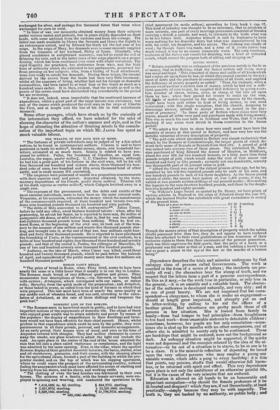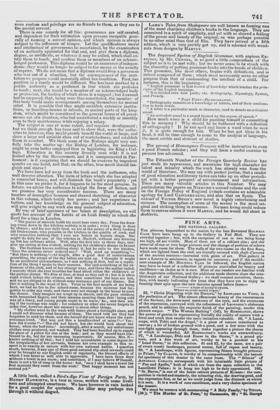Dependence describes the trials and miseries undergone by that unhappy
class of persons called Governesses. The work is couched in the form of a series of letters ; the incidents are pro- bably all real ; the characters bear the stamp of truth, and we suspect that the letters form a part of a genuine correspondence. Be this as it may,—be the work true in particular, or only true in the general,—it is an amiable and a valuable book. The charac- ter of the authoress is developed naturally, and very ably ; and it is one of great beauty. We are not surprised that her corre- spondent—a clergyMan, to whom she is under an engagement— should at length grow impatient, and abruptly put an end to letter-writing, by calling to his aid the offices of a brother priest. Her adventures are pretty much those of all persons in her situation. She is tossed from family to family—from bad temper to bad principles—from haughtiness to too hard work—from unamiable matrons to detestable children:- sometimes, however, her pupils are her only consolation—some- times she is shut up for months with no other companions, and at others she is admitted to society only to be contemned. These are hardships that might be endured, were not the background so dark. An unhappy situation might be supported, if the spirits: were not depressed and the energies relaxed by the idea of the al- ternative—to be out of a situation is to starve, to be in one is to be a slave. It is the miserable reflection of depending for bread upon the very odious persons who may employ a young ans amiable woman, which adds a pang to every hardship: it is this) that points, nay poisons, shafts that would otherwise fall harm- less, or be returned with spirit and effect. This very dependence upon place is not only the embitterer of an otherwise painful life, but it is the cause of the very miseries that are endured. Education is allowed on all hands to be an honourable and important occupation—why should the female professors of it be ill-treated and despised ? which they are, if not theoretically, at least practically—simply because they may be with impunity. The truth is, they are backed by no authority, no public body ; and
even custom and privilege are no friends to them, as they are to the menial servant.
There is one remedy for all this : governesses are self-created, and dependent for their estimation upon persons incapable gene- rally of forming a correct opinion, and which opinion is always subject to the influence of temper. Let the qualifications moral and intellectual of governesses be ascertained, by the examination of an authority appointed for that end, and give them a diploma, degree, or certificate, or whatever it may be called, which shall en- title them to teach, and confirm them as members of an acknow- ledged profession. This diploma would be an assurance of indepen-
dence : they would no longer be subject to the mercy or the cruelty of caprice. We do not mean that a diploma would keep a governess
who was out of a situation, but the consequences of the insti- tution we propose would materially affect her condition. First, her position in a family would be different. She has been marked by a public authority as a proficient in that which she professes to teach ; next, she would be a member of an acknowledged body or profession, the feeling of which alone is a support ; but it cannot but be supposed, that, being once thus constituted, the member- of this body would make arrangements among themselves for mutual relief. It is possible that they might establish extensive institu-
tions, or boarding-houses or schools, in central parts of the king- dom, which might be considered as the general home of all gover- nesses out of a situation, who had contributed a weekly or monthly sum to their maintenance while enjoying a salary.
The subject is one of some extent, and requires development ; but we think enough has been said to show that, were the autho- rities to interfere, they might greatly benefit the world at large, and draw a large and amiable class out of wretchedness, and establish them in comfort. We think some of the Bishops might very use- fully take the matter up : the Bishop of London, for instance, might be even better employed than in legislating for King's Col- lege. Education in this country literally runs wild: it is not looked after by the Government, and it is unrepresented in Par- liament : is it surprising that we should be overrun by impudent quacks on one hand, and that, on the other, true merit should lan- guish and starve ? We have been led away from the book and the authoress, who well deserve attention. The form of letters which she has adopted is somewhat heavy, and will diminish the book's popularity : yet in this case we prefer it, for it happens to be the most genuine. In future, we advise the authoress to adopt the form of fiction, and we promise her very considerable success. There are many touches of descriptive humour and shrewd sketching of character in this volume, which testify her power ; and her experience in tuition, and her knowledge on the general subject of education, will give weight to any work she may undertake. By way of brief specimen of her talent at description, we will quote her account of the habits of an Irish family in which she lived for a time in London.
"The genius of misrule holds his court here every day. From the draw- ing-room down to the kitchen nothing is in order; every thing is done by chance ; and for our daily food, we are at the mercy of a dirty-looking old Irishwoman, who presides in the kitchen in the quality of cook, and who resembles nothing that I ever saw before in human shape. She might do duty for one of the witches in Macbeth, without any dressing 'up but her ordinary attire. Well, after the first two or three days, ima- gine me sitting at two o'clock, waiting for the children's dinner to be sent up. The footman knows nothing about it, but he calls to the kitchen, `Sure the mistress never ordered any!' ` Well, send up something?— ' But there is nothing.'—At length, after a good deal of subterranean grumbling, the scraps of the day before are sent up. I thought it might be an accidental circumstance, so I said nothing at first, but on a repeti- tion of the thing I spoke to their mamma. She said something of the ill- humour of the cook, and of her strange ways, and there the matter ended. I scarcely think she ever troubles her head about either the children's or the parlour dinner. We dine at four, at least so they call it; but it is often eight o'clock before she returns, and then sometimes the keys are lost, and we are obliged to do without some necessary part of our dinner. But this is nothing to the want of fire. Twice in the first month of my being here, we had no fire in the school-room, because the mistress had for.. gotten to order any coals, and there were not enough in the house to cook the dinner. Only imagine me wrapt up in shawls, and the poor children • with benumbed fingers, and their mamma assuring them that being cold was all a fancy, and young people ought to be warm,' &c:, and then ask- ing if the carriage was ready ; for somehow or other she never forgets to 'order that, however short her memory is about other things.
" My clothes went to the wash with theirs about a fortnight since, and I could not discover what became of them. The maid told me they had forgotten to send for them, and she herself did not know where the wash- erwoman lived. `But was not this a handkerchief of mine Yes ; bow did it come ?'—' She did not know, but she would look about the house, when she bad time.' Accordingly, after a search, my unfortunate clothes were produced, not washed. They had been bundled up to supply the place of a pillow for one of the beds ; and so they would have con- tinued to do, but for my unceasing importunity. Of course, Mrs. N— .knows nothing of all this; but I hold her accountable in some degree for the irregularities of her servants, because her own example in this re- spect is so exactly in unison with her own national habits. I question much, however, if any one of these good-natured slip-shod servants could ever be brought to our English order of regularity, the blessed effects of which I was never so well. able to appreciate. I have been three days without a towel in my.room; and sometimes, if I may believe M`Donald, there is not a bit of soap in the house: but, sure I shall have a towel the -first moment they come from the wash.' That happy moment has not -arrived yet."



























 Previous page
Previous page